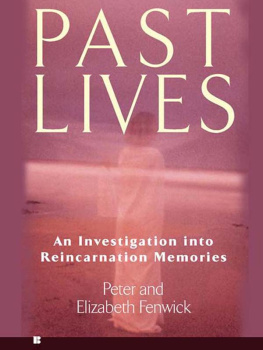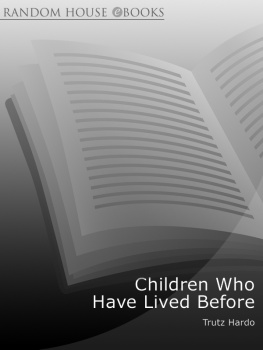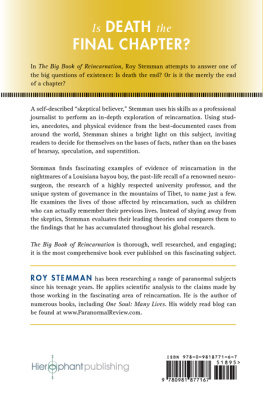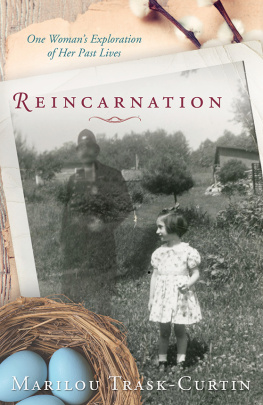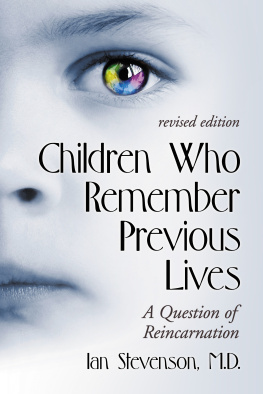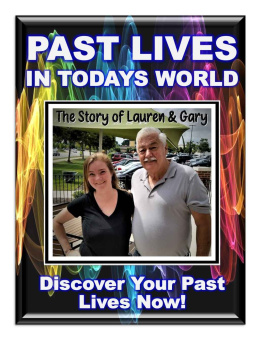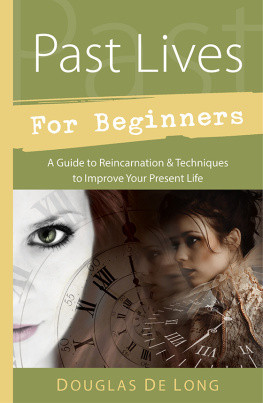Berkley Books
Published by the Penguin Group,
Penguin Putnam Inc., 375 Hudson Street, New York, New York 10014, U.S.A.
Penguin Books Ltd, 27 Wrights Lane, London W8 5TZ, England
Penguin Books Australia Ltd, Ringwood, Victoria, Australia
Penguin Books Canada Ltd, 10 Alcorn Avenue, Toronto, Ontario, Canada M4V 3B2
Penguin Books (N.Z.) Ltd, 182-190 Wairau Road, Auckland 10, New Zealand
Penguin Books Ltd, Registered Offices:
Harmondsworth, Middlesex, England
First published by Berkley Books, a member of Penguin Putnam Inc.
Copyright 1999 by Peter and Elizabeth Fenwick
All rights reserved
Fenwick, Peter and Elizabeth. Past Lives: An Investigation into Reincarnation Memories.
ISBN: 978-1-1012-0390-3
Without limiting the rights under copyright reserved above, no part of this publication may be reproduced, stored in or introduced into a retrieval system, or transmitted, in any form, or by any means (electronic, mechanical, photocopying, recording, or otherwise), without the prior written permission of both the copyright owner and the above publisher of this book. Making or distributing electronic copies of this book constitutes copyright infringement and could subject the infringer to criminal and civil liability.
First edition (electronic): September 2001
PETER FENWICK is a Fellow of the Royal College of Psychiatrists. He holds a research post as a senior lecturer at the Institute of Psychiatry in London. He has a special interest in sleep and has been involved in research into lucid dreams.
ELIZABETH FENWICK is a professional writer on health and family matters. She has had books on health and child care published by Family Doctor Publications, and coauthored several others with her husband, Peter.
For
James and Sarah
June and Hugh
and
Benjamin Brooke
I hold that when a person dies
His soul returns again to earth;
Arrayed in some new flesh disguise,
Another mother gives him birth.
With sturdier limbs and brighter brain
The old soul takes the road again.
John Masefield
F ROM the time he was a small child Alan Pring knew that he wanted to fly. When he was only five or six he bewildered his parents by the intensity of this wish and by his determination that one day he would become a pilot. His chance came when he joined the RAF during the Second World War.
When I began flying in 1943 my instructor was convinced that I had piloted aircraft before. I just knew how to fly and every new experience to which I was introduced in the air was already a memory. Similarly, the first time I encountered the smell of aircraft-fabric dope I knew that I had experienced it previously. The odour gave me the most peculiar sense of pleasure, as if it was associated with very happy memories. My love of flying has never faded, but it is directed always in my memory towards biplanes. I feel that I flew Sopwith aircraft.
When the war ended in 1945 I was grounded, but in 1947 I rejoined the Royal Air Force Voluntary Reserve (RAFVR) and resumed flying, albeit in Tiger Moths, which was the only aircraft that the RAFVR had until the arrival of the Chipmunk in 1950. I flew at weekends and at summer camps with other pilots from Pengam Moor airfield (now a housing estate) at Cardiff. One day six of us decided to have a dogfight. The planes had no radios, so all flying, including formation flying, was done using hand signals. We took off in formation and then split up to climb to altitude and rendezvous over a specified landmark at a specified time. The object was to gain as much height as possible and to remain out of sight of the other pilots until the dogfight began. To get on the tail of another aircraft constituted a kill; but the range had to be not more than 20 yards. The eventual overall victor would benefit from his kills in the mess.
We drew lots for particular aircraft because although outwardly identical they all had their own characteristics. I drew the prize Tiger, which had a different propeller to all the others in that its pitch gave the aircraft a much greater rate of climb.
I had a huge advantage, because in the set time I would be able to climb higher than my five opponents and be able to conceal myself in the sun and have the extra speed that a dive would give. In the allotted time of 15 minutes I had climbed to over 9,000 feet, and over the selected map reference I looked down, in confident anticipation, for my opponents. Soon I spotted four of them at least 1,000 feet below me. Secure in the knowledge that no other Tiger could be near my height I concentrated on searching for the fifth aircraft. Suddenly, with an ominous sinking feeling in my stomach, I twisted in my tight harness and looked behind me. There, not five yards from my tail, was the whirring propeller of the fifth Tiger. The pilot had a huge grin on his face as he pointed one hand around his windscreen and fired his guns. At that moment I experienced a horrendous feeling of doom. In an almost subliminal flash it was no longer a Tiger Moth behind me but a Fokker triplane, and above its round engine cowl I saw the flashes of its two machine guns and immediately felt terrible blows in my back and momentarily everything went black. It lasted only a second or two, and then I watched as the other pilot broke away to dive on other victims. For a while I was in a state of shock, and I must admit that I was quite emotionally upset as I descended to fly back to the airfield. It was not losing the contest that upset me, but the conviction that it had all happened before and that I had been killed through carelessness and over-confidence in a dogfight in the First World War.
Later, in the bar, the other pilot explained how he had out-climbed me. He had used a thermal up-current from the cooling towers of a nearby power station. I had made a fatal assumption that my plane would be the highest.
Alan has never had any other specific memory of a previous existence and remains dubious of most tales in which people recount details of other lives. But many years after this experience, while undergoing surgery in Manchester Royal Infirmary, he had a near-death experience which had a profound effect on him. It convinced him that it was impossible to cease to exist. Given this belief, he says, it would seem plausible, if not logical, that reincarnation is a possibility.
Alans conviction that it is impossible for man to cease to exist lies at the heart of a belief in reincarnation. Reincarnation assumes that man has a component that can survive the death of the body and contains elements of both memory and personality. It is one of the oldest and most widely held of mankinds spiritual beliefs. Henry Ford, Gustav Mahler, Richard Wagner and David Lloyd George are among those who have expressed a belief in reincarnation. So too did General Patton and Lord Dowding, who directed the Battle of Britain in the Second World War. Napoleon was convinced that he had a previous existence as the Emperor Charlemagne. The actress Shirley MacLaine recounted several vivid past-life experiences in her book Out on a Limb. And Diana, Princess of Wales, is said to have told friends that she believed she was a nun in a previous life.
Even today, and even in the West, when we say Hes his grandfather all over again, we seem to be arguing for more than just the supremacy of the genes. An essential part of the belief in reincarnation is that some features of the person who dies survive death and are transmitted to an unborn child. Conceptually, there has to be a vehicle to carry these qualities, a vehicle that is able to carry aspects of the donors experience, memories and personality, hold them independently of the donor after death, and then transfer them into a developing brain so that the reincarnee takes on some or all of the characteristics of the donor and may have access to some of the donors memories. This vehicle is often called the soul. The concept of soul is a complicated one and contains wide differences between cultures, but throughout this book it will be used in this very general sense. This concept is also based on the implicit assumption that there is a linear time to which the soul is boundthat there is a before and an after, a future life and a past lifea concept that fits satisfactorily the current popular Western view of the world. However, Western physics no longer defines time in a literal linear fashion, and so the idea of flowing from one lifetime to another in a linear sense is already flawed.

